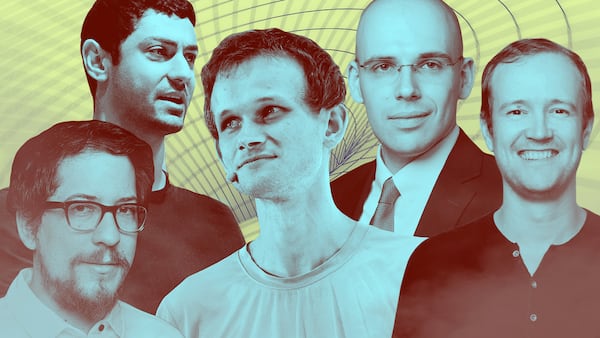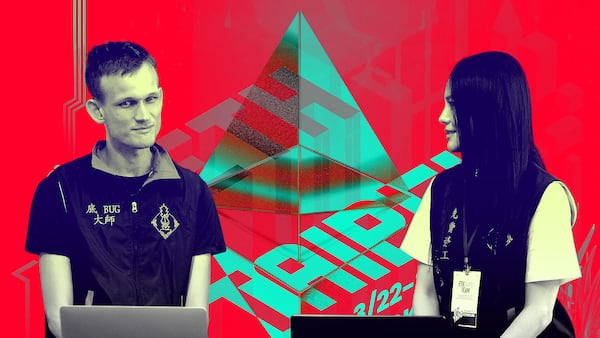- Ethereum founder Vitalik Buterin advocated for “degen communism” on his blog.
- He touted several ways crypto companies have shared their wealth and protect less wealthy users.
- Governments, meanwhile, should embrace YIMBY policies and immgiration, according to the software developer.
Civil discourse among well-meaning experts is a “reactionary,” outdated ideal, according to Ethereum co-founder Vitalik Buterin.
Instead, governments and, of course, crypto projects should harness the chaos of markets and social media for society’s benefit, an ideology he dubbed “degen communism” in a political manifesto published on his blog this week.
Buterin, a multimillionaire and perhaps the single most influential person in crypto, hasn’t been shy about sharing his thoughts on politics and society.
But his blog post, titled “Degen communism: the only correct political ideology,” distilled years of scattered thoughts into a list of policy prescriptions for governments as well as for the applications and communities built on top of blockchains like Ethereum.
Governments should look no further than Austin, Texas, for an example of degen communism in action, he wrote.
In Texas’ capital city, relatively liberal housing construction laws have led to a boom in the building of new apartments and homes, and rent has fallen more than 11% since 2022 — a clear example of market forces working to the benefit of the entire city.
(Some longtime residents might beg to differ — housing values are still near their all-time high and “extremely overvalued,” according to an economist interviewed by the Wall Street Journal.)
Moreover, Texas’ focus on taxing property over income approaches Buterin’s Georgist view on redistribution of wealth.
“Land value taxes, a yearly property tax proportional on the value of land (but not the buildings on the land), have been broadly supported by many economists for over a century,” he wrote.
Taxing intellectual property
To spur innovation, Buterin supports a decades-old idea to revamp the intellectual-property regime.
According to Buterin, copyright and patent holders should pay an annual tax on the self-assessed value of their intellectual property. Meanwhile, anyone willing to pay that amount can use that copyright or patent without its owners’ permission.
Finally, a dramatic expansion of legal immigration would be a boon for the world’s poor, according to Buterin. The onus should be on governments to prove someone would harm their society, he wrote, rather than on would-be immigrants to prove they won’t be a burden.
Alternatively, someone can vouch for a would-be immigrant, putting down a deposit they would lose in the event the newcomer breaks any laws.
Crypto projects
Crypto projects, on the other hand, do a fine job of harnessing markets’ chaos for profit. And those projects — memecoins, blockchains, and decentralised applications — should share the wealth, Buterin wrote.
Examples include the “retroactive public-goods funding” program run by the the Optimism Collective, a group of companies and token holders affiliated with the Optimism blockchain.
The Collective uses funds to retroactively reward Optimism-based projects that have delivered the most value to its ecosystem.
“Most modern economies fail to support the public goods they depend on,” Bobby Dresser, general manager of the Optimism Foundation, previously told DL News.
“If we can prove a better economic model for this Collective, we take one small step towards a better system for the world,” Dresser said.
Buterin called it an excellent example of something that captures “the upsides of chaos.”
“More projects should replicate this model,” he wrote.
The Starknet airdrop was another example. Despite some controversy around eligibility criteria, Buterin praised its decision to reward solo stakers, hobbyists who help run the Ethereum blockchain.
Projects should also consider a Federal Deposit Insurance Corp.-style payout for their least-wealthy users in the event they get hacked or otherwise go insolvent, he wrote.
Chaos era
In the US, political polarisation is at an all-time high. In Europe, once-fringe political parties are more powerful than ever. And according to the nonprofit Freedom House, authoritarianism is on the march.
Amid this chaos, some yearn for politics they recall as less combative.
But the “virtues of the old ideals of civility and decorum” represent the “fundamentally reactionary mentality” of the “ancien regime,” according to Buterin.
Instead, society should look to the internet for inspiration. And what the internet wants “is chaos.”
“Like the occasional forest fire and its positive effects on antifragility of natural ecosystems, chaos is the mother of revitalization and renewal,” Buterin wrote.
Aleks Gilbert is DL News’ New York-based DeFi correspondent. You can reach him at aleks@dlnews.com.






